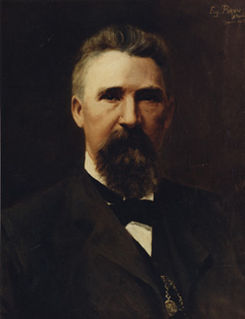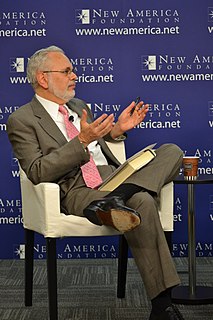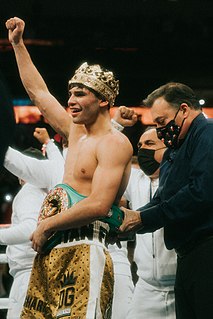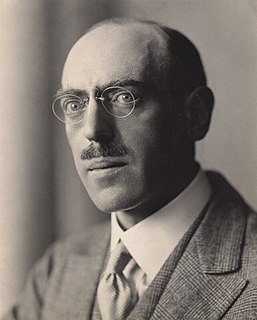Top 1200 Market Failure Quotes & Sayings - Page 20
Explore popular Market Failure quotes.
Last updated on November 15, 2024.
Berkshire's whole record has been achieved without paying one ounce of attention to the efficient market theory in its hard form. And not one ounce of attention to the descendants of that idea, which came out of academic economics and went into corporate finance and morphed into such obscenities as the capital asset pricing model, which we also paid no attention to. I think you'd have to believe in the tooth fairy to believe that you could easily outperform the market by seven-percentage points per annum just by investing in high volatility stocks.
I am encouraged as I look at some of those who have listened to their "different drum": Einstein was hopeless at school math and commented wryly on his inadequacy in human relations. Winston Churchill was an abysmal failure in his early school years. Byron, that revolutionary student, had to compensate for a club foot; Demosthenes for a stutter; and Homer was blind. Socrates couldn't manage his wife, and infuriated his countrymen. And what about Jesus, if we need an ultimate example of failure with one's peers? Or an ultimate example of love?
Rip Van Winkle would be the ideal stock market investor: Rip could invest in the market before his nap and when he woke up 20 years later, he'd be happy. He would have been asleep through all the ups and downs in between. But few investors resemble Mr. Van Winkle. The more often an investor counts his money - or looks at the value of his mutual funds in the newspaper - the lower his risk tolerance.
The way to improve productivity is not to bring in experts to talk about inputs - seed, equipment and materials, pesticides or water supply. The way to start is to provide an assured market, a fair price, and a system through which rural producers can market their produce which is reasonably efficient and can transfer to them the maximum share of the consumers' money. If such a structure is erected, the producers will then seek the inputs and materials they need to increase their production and productivity.
Experience conclusively shows that index-fund buyers are likely to obtain results exceeding those of the typical fund manager, whose large advisory fees and substantial portfolio turnover tend to reduce investment yields. Many people will find the guarantee of playing the stock-market game at par every round a very attractive one. The index fund is a sensible, serviceable method for obtaining the market's rate of return with absolutely no effort and minimal expense.
Think about the difference between how your local gas station and congressman respond to a spike in oil prices. One has the price placard outside changed to reflect the reality of the market within hours. The other sends out a press release, tries to organize a hearing, and at the end of amount accomplishes nothing. Meanwhile, the gas station has already made at least thirty additional adjustments to the realities of the market while your politico fails to get anything more than easy media.
Though fairy tales end after ten pages, our lives do not. We are multi-volume sets. In our lives, even though one episode amounts to a crash and burn, there is always another episode awaiting us and then another. There are always more opportunities to get it right, to fashion our lives in the ways we deserve to have them. Don't waste your time hating a failure. Failure is a greater teacher than success.
It is eminently possible to have a market-based economy that requires no such brutality and demands no such ideological purity. A free market in consumer products can coexist with free public health care, with public schools, with a large segment of the economy -- like a national oil company -- held in state hands. It's equally possible to require corporations to pay decent wages, to respect the right of workers to form unions, and for governments to tax and redistribute wealth so that the sharp inequalities that mark the corporatist state are reduced. Markets need not be fundamentalist.
On the table, Donald Trump: I'm gonna let Obamacare fail. I am going to let it fail. I am not gonna own this. This is an utter failure, utter disaster. I've tried. I worked with people. Obviously we don't have enough Republicans who want to vote this way. We need more Republicans in 2018, but I'm gonna let it fail 'cause I am not owning this baby. So failure, which is Obamacare, stays in place with all of its problems, expenses, failures versus repealing it. I'm telling you, the most painful choice here is leaving Obamacare in place.
Our whole culture is based on the appetite for buying, on the idea of a mutually favorable exchange. .... For the man an attractive girl - and for the woman an attractive man - are the prizes they are after. 'attractive' usually means a nice package of qualities which are popular and sought after on the personality market. What specifically makes a person attractive depends on the fashion of the time, physically as well as mentally. ... Two persons thus fall in love when they feel they have found the best object available on the market, considering the limitations of their own exchange values.
Let’s begin with capitalism, a word that has gone largely out of fashion. The approved reference now is to the market system. This shift minimizes - indeed, deletes - the role of wealth in the economic and social system. And it sheds the adverse connotation going back to Marx. Instead of the owners of capital or their attendants in control, we have the admirably impersonal role of market forces. It would be hard to think of a change in terminology more in the interest of those to whom money accords power. They have now a functional anonymity.
If the stock market does go through a crisis of confidence, which I think clearly will happen one of these days, no one can predict just like you couldn't the dot com crash or the Lehman crash, but when it goes down it will go down by thousands of points because everyone will panic. No one owns this market today because they believe there's a huge sunny future for the United States economy. They're buying because they think the Fed can keep the thing pumped up, the bubble expanding.
Value investing doesn't always work. The market doesn't always agree with you. Over time, value is roughly the way the market prices stocks, but over the short term, which sometimes can be as long as two or three years, there are periods when it doesn't work. And that is a very good thing. The fact that our value approach doesn't work over periods of time is precisely the reason why it continues to work over the long term.
One of the great things about design is that it's truly international. No one in the design industry would say, "This country is mine," or "I will make it look this way because it's for an American market and that way for a Chinese market." If you look at all of the Apple products, they are the same everywhere . . . I mean, I can't deny that I love traveling. It's a very healthy thing to be able to appreciate other cultures - or at least witness them firsthand. And all of that goes into helping someone be a good designer, because it's an international business.
There's no question here that every effort is made to earn as much money off tobacco as possible. At the same time, the same people who are doing everything they can to get every penny out of this product, are condemning its use, are bludgeoning and impugning its users, and denying them every day more and more places where they can legally use the product. In the process, they have been the architects of the black market. The people in charge of all this have themselves set the stage for black market circumstances to prosper and thrive.
As Paul says, even though we as human beings know God, we refuse to acknowledge him. That's what Peter did. He refused even to "know" Jesus! Peter's failure reflects all our failure. It forces us to face the reality about ourselves. But the point of the story is that Jesus foretold this - he knew it was coming. And Jesus forgave Peter, when Peter confessed his love for Jesus. So the story illustrates both the horrible nature of sin, and the amazing reality of grace. That's essential to the whole meaning of the gospel.
There are times when a market such as housing, transportation or the stock or mortgage market keep rising and people with capital want to join in this growth. Soon the markets become overheated, partly because of the abundance of investment money and speculation. This is when the government should raise interest rates and increase the cost of borrowed money. Governments are shy about doing this because it could cause the very recession. Yet this is the best time to do this so that the inevitable recession never reaches the magnitude of the recent Great Recession.
If you're remarkable, then it's likely that some people won't like you. That's part of the definition of remarkable. Nobody gets unanimous praise - ever. The best the timid can hope for is to be unnoticed. Criticism comes to those who stand out.
Playing it safe. Following the rules. They seem like the best ways to avoid failure. Alas, that pattern is awfully dangerous. The current marketing “rules” will ultimately lead to failure. In a crowded marketplace, fitting in is failing. In a busy marketplace, not standing out is the same as being invisible.
First, let's look at the importance of the young adult in the cigarette market. In 1960, this young adult market , the 14 to 24 age group, represented 21% of the population. As seen by this chart, they will represent 27% of the population in 1975, they represent tomorrow's cigarette business, as this 14 -24 age group matures, they will account for a key share of the total cigarette volume -- for at least the next 25 years .
There is a bit of a problem with the match between derivative securities markets and the primary markets. We have long ago instituted principles, essentially high margin requirements, to prevent certain instabilities in the stock market, and I think they're basically correct. The trouble is that there's a linkage, let's say, between something like the stock market and the index futures markets, and the fact that the margin requirements are very different, for example, played some role in the October '87 crash.
Failure is easy to measure. Failure is an event.Harder to measure is insignificance. A nonevent. Insignificance creeps, it dawns, it gives you hope, then delusion, then one day, when you’re not looking, it’s there, at your front door, on your desk, in the mirror, or not, not any of that, it’s the lack of all that. One day, when you are looking, it’s not looking, no one is. You lie in your bed and realize that if you don’t get out of bed and into the world today, it is very likely no one will even notice.
If you go back to Adam Smith, you find the idea that markets and market forces operate as an invisible hand. This is the traditional laissez-faire market idea. But today, when economics is increasingly defined as the science of incentive, it becomes clear that the use of incentives involves quite active intervention, either by an economist or a policy maker, in using financial inducements to motivate behavior. In fact, so much though that we now almost take for granted that incentives are central to the subject of economics.
No true work since the world began was ever wasted; no true life since the world began has ever failed. Oh, understand those two perverted word, failure and success and measure them by the eternal, not the earthly, standard. When after thirty obscure, toilsome, unrecorded years in the shop of the village carpenter, one came forth to be pre-eminently the man of sorrows, to wander from city to city in homeless labors, and to expire in lonely agony upon the shameful cross -- was that a failure.
The great thing about the Internet is - our show is totally modular. Every piece can be popped in and out. They're relatively short pieces. They're not long. And we can say, "here' s one way to market it. Take these pieces out of the show and put them on the Internet." And we're doing dirtier cuts and put those on the Internet. It's a real great way to market the show. This is finally the year a show like this can happen.
"No one is doing what we're doing." This is a bummer of a lie because there are only two logical conclusions. First, no one else is doing this because there is no market for it. Second, the entrepreneur is so clueless that he can't even use Google to figure out he has competition. Suffice it to say that the lack of a market and cluelessness is not conducive to securing an investment. As a rule of thumb, if you have a good idea, five companies are going the same thing. If you have a great idea, fifteen companies are doing the same thing.
I call this the Fundamental Problem of Political Economy. How do we limit the power that idiots have over us? ... [Milton] Friedmans insight is that a market limits the power that others have over us; conversely, limiting the power that others have over us allows us to have markets. Friedman argued that no matter how wise the officials of government may be, market competition does a better job of protecting us from idiots.
What then is to be the lot of Rossetti's fame and influence? 'An amateur who failed in two arts', it is true; yet it hardly harms Rossetti or touches his standing. On the contrary, it defines both very brilliantly. The small word 'failed' is a small word and little more to artists who are forever going on until they give up over a game that must be lost. Every artist, when confronted by the immensities of art, which is life, must confess to failure. A failure is a thing very relative.
An index fund is a fund that simply invests in all of the stocks in a market. So, for example, an index fund might invest in every single stock or almost every single stock in the U.S. market, it might invest in every single stock abroad, or it might invest in all of the bonds that are out there. And you can make a perfectly fine investing portfolio that mixes equal parts of all three of those.
Losing ... really does say something about who you are. Among other things it measures are: do you blame others, or do you own the loss? Do you analyze your failure, or just complain about bad luck? If you're willing to examine failure, and to look not just at your outward physical performance, but your internal workings, too, losing can be valuable. How you behave in those moments can perhaps be more self-defining than winning could ever be. Sometimes losing shows you for who you really are.
The NSF study projected a shortfall of 675,000 scientists and engineers without considering the future demand for such individuals in the marketplace. It simply observed a decline in the number of 22-year-olds and projected that this demographic trend would result in a huge shortfall. This could be termed the supply-side theory of labor market analysis. But making labor market projections without considering the demand side of the equation doesn't pass the laugh test with experts in the field.
One of the great things about a free market is that it's inherently and indefatigably Darwinistic. Left to its own devices, a free market will eventually weed out the stupid from both 'ends' of the food chain otherwise described as supply and demand. As money is liberated from the hands of the stupid, those who would sell products or services to the stupid will eventually lose their share of the marketplace. Devoid of any 'benevolent' interference from government, the process is gloriously relentless, and cannot help but yield a successively smarter class of participants.
beware the average man the average woman beware their love, their love is average seeks average but there is genius in their hatred there is enough genius in their hatred to kill you to kill anybody not wanting solitude not understanding solitude they will attempt to destroy anything that differs from their own not being able to create art they will not understand art they will consider their failure as creators only as a failure of the world
If you let interest rates be freed, be set by the free market, they would rise dramatically. There would be a lot of broken furniture on Wall Street. It needs to be broken. The back of the speculative bubble would be broken and we could slowly heal the financial system. That's what I think we need to do but it's never going to happen because there's trillions of asset values dependent on the Fed continuing to suppress, repress interest rates and shovel $85 billion a month of liquidity into the market.
The idea that a bell rings to signal when investors should get into or out of the stock market is simply not credible. After nearly fifty years in this business, I do not know of anybody who has done it successfully and consistently. I don't even know anybody who knows anybody who has done it successfully and consistently. Yet market timing appears to be increasingly embraced by mutual fund investors and the professional managers of fund portfolios alike.
One of the commonest mistakes and one of the costliest is thinking that success is due to some genius, some magic - something or other which we do not possess. Success is generally due to holding on, and failure to letting go. You decide to learn a language, study music, take a course of reading, train yourself physically. Will it be success or failure? It depends upon how much pluck and perseverance that word decide contains. The decision that nothing can overrule, the grip that nothing can detach will bring success.
The Yogic sages say that all the pain of a human life is caused by words, as is all the joy. We create words to define our experience and those words bring attendant emotions that jerk us around like dogs on a leash. We get seduced by our own mantras (I'm a failure I'm lonely I'm a failure I'm lonely) and we become monuments to them. To stop talking for a while, then, is to attempt to strip away the power of words, to stop choking ourselves with words, to liberate ourselves from our suffocating mantras.
There is a risk of death associated with donating a piece of liver. It's about one in 500 for the risk of death. The risk of death of donating a kidney is about one in 3000, so this is a riskier operation than donating a kidney. The stakes are usually higher for the recipient of the transplant because unlike kidney failure, where you have a dialysis machine, in liver failure we don't have that kind of machine that allows a patient to survive until they can get a cadaver organ.
We are convinced that the intelligent investor can derive satisfactory results from pricing of either type (market timing or fundamental analysis via price). We are equally sure that if he places his emphasis on timing, in the sense of forecasting, he will end up as a speculator and with a speculator's financial results." And "The speculator's primary interest lies in anticipating and profiting from market fluctuations. The investor's primary interest lies in acquiring and holding suitable securities at suitable prices.
Failure, then, failure! so the world stamps us at every turn. We strew it with our blunders, our misdeeds, our lost opportunities, with all the memorials of our inadequacy to our vocation. And with what a damning emphasis does it then blot us out! No easy fine, no mere apology or formal expiation, will satisfy the world's demands, but every pound of flesh exacted is soaked with all its blood. The subtlest forms of suffering known to man are connected with the poisonous humiliations incidental to these results.
I have worked in the homes of many successful people and have seen firsthand that everyone fails in life, but failure can be a gift if you don't give up and are willing to learn, improve, and grow because of it. You see, failure often serves as a defining moment, a crossroads on the journey of your life. It gives you a test designed to measure your courage, perseverance, commitment, and a dedication. Are you a pretender who gives up after a little adversity or a contender who keeps getting up after getting knocked down?
Every failure is a step to success. Every detection of what is false directs us towards what is true: every trial exhausts some tempting form of error. Not only so; but scarcely any attempt is entirely a failure; scarcely any theory, the result of steady thought, is altogether false; no tempting form of Error is without some latent charm derived from Truth.
The business plan should address: "How will I get customers? How will I market the product or service? Who will I target?" The principles of a business plan are pretty much the same. But after page one to two, everything is unpredictable, because costs or competition will change and you don't know how things will be received by the market. You have to be able to continually adapt. Companies that fail to adapt will die. Others are brilliant at adapting.
Gary Shteyngart has written a memoir for the ages. I spat laughter on the first page and closed the last with wet eyes. Un-put-down-able in the day and a half I spent reading it, Little Failure is a window into immigrant agony and ambition, Jewish angst, and anybody's desperate need for a tribe. Readers who've fallen for Shteyngart's antics on the page will relish the trademark humor. But here it's laden and leavened with a deep, consequential, psychological journey. Brave and unflinching, Little Failure is his best book to date

























































